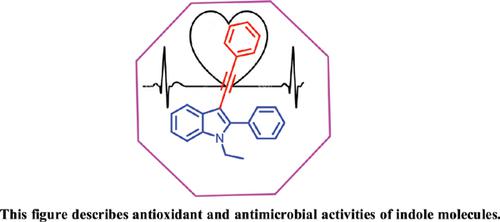Letters in Drug Design & Discovery ( IF 1.2 ) Pub Date : 2021-05-01 , DOI: 10.2174/1570180817999201109203226 Aslıhan Kurt-Kızıldoğan 1 , Çiğdem Otur 1 , Can Yılmaz 2 , Sevki Arslan 3 , Dogukan Mutlu 3 , Arif Kivrak 4 , Muheb Algso 4 , Abdussamet Kayhan 2 , Doğan Çetin 2 , Metin Konus 2

|
Aims: In this study experiments were carried out to explore antioxidant, antimicrobial, cytotoxic properties of novel indole derivative 1-ethyl-2-phenyl-3-phenylethyl-3-thiophen-2-yl-1Hindole (EPI) together with its effect on glutathione S-transferases (GST) activities in human liver carcinoma (HepG2) cells.
Background: Indoles probably represent one of the most important heterocyclic structures that have been attracting the interest of many scientists in drug discovery.
Objective: The present study was carried out to explore antioxidant, antimicrobial, cytotoxic properties of novel indole derivative 1-ethyl-2-phenyl-3-phenylethyl-3-thiophen-2-yl-1H-indole (EPI) and its effect on glutathione S-transferases (GST) activities in human liver carcinoma (HepG2) cells.
Materials and Methods: Pd-catalyst Sonogashira coupling reactions, MTT Assay, Antioxidant capacity test, Antimicrobial test, GST enzyme activity test.
Results: 1-ethyl-2-phenyl-3-(phenylethynyl)-1H-indole had antioxidant and antimicrobial properties. It displayed significant induction in glutathione S-transferases (GST) enzyme activity in human liver cancer cell lines (HepG2), but cytotoxic effect on all tested cancer cell lines could not be observed.
Conclusion: All of these results showed that 1-ethyl-2-phenyl-3-(phenylethynyl)-1H-indole had antioxidant and antimicrobial properties without cytotoxic effect, which could make it a promising active component with further studies.
中文翻译:

基于吲哚的新型小分子的合成、细胞毒性、抗氧化和抗菌活性
目的:本研究通过实验研究新型吲哚衍生物 1-乙基-2-苯基-3-苯基乙基-3-噻吩-2-基-1吲哚(EPI)的抗氧化、抗菌、细胞毒特性及其对人体的影响。人肝癌 (HepG2) 细胞中的谷胱甘肽 S-转移酶 (GST) 活性。
背景:吲哚可能是最重要的杂环结构之一,吸引了许多科学家对药物发现的兴趣。
目的:本研究旨在探讨新型吲哚衍生物 1-乙基-2-苯基-3-苯乙基-3-噻吩-2-基-1H-吲哚 (EPI) 的抗氧化、抗菌和细胞毒特性及其对人体的影响。人肝癌 (HepG2) 细胞中的谷胱甘肽 S-转移酶 (GST) 活性。
材料与方法:Pd-催化剂Sonogashira偶联反应、MTT分析、抗氧化能力测试、抗菌测试、GST酶活性测试。
结果:1-乙基-2-苯基-3-(苯基乙炔基)-1H-吲哚具有抗氧化和抗菌特性。它在人肝癌细胞系 (HepG2) 中显示出对谷胱甘肽 S-转移酶 (GST) 酶活性的显着诱导,但未观察到对所有测试癌细胞系的细胞毒性作用。
结论:所有这些结果表明,1-乙基-2-苯基-3-(苯乙炔基)-1H-吲哚具有抗氧化和抗菌特性,且无细胞毒作用,可使其成为有前景的活性成分,有待进一步研究。











































 京公网安备 11010802027423号
京公网安备 11010802027423号